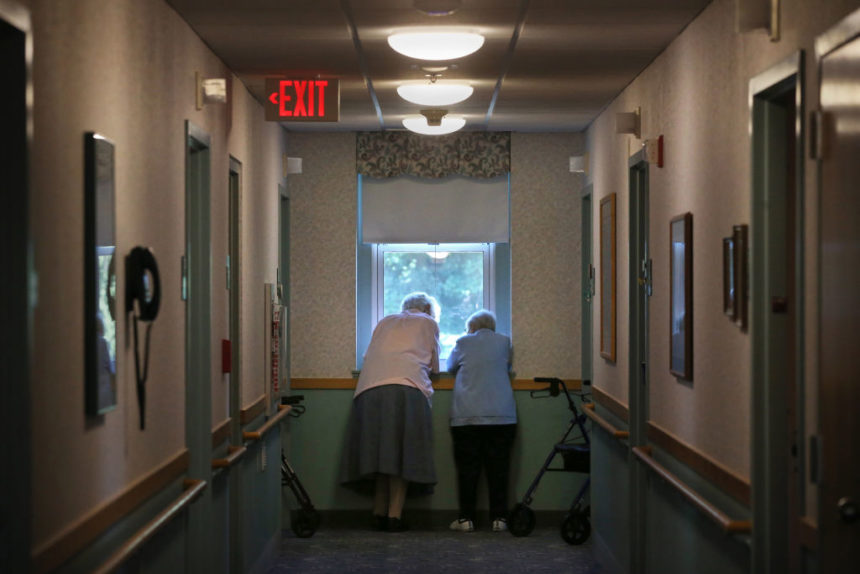When the first cases of COVID-19 struck the U.S. in January 2020, nursing homes and other long-term care facilities were among the hardest hit. Now, in an effort to stem future outbreaks — breakthrough and otherwise — the White House has proposed mandating vaccinations for nursing home staff.
In an announcement earlier this month, President Joe Biden said the government would withhold federal funding from nursing homes that failed to comply with the guidelines. It marked the first time the White House has threatened to, in effect, punish organizations reluctant to impose mandates of their own.
“More than 130,000 residents of nursing homes have sadly, sadly, over the period of this virus, passed away,” Biden said. “At the same time, vaccination rates among nursing home staff significantly trail the rest of the country. With this announcement, I’m using the power of the federal government as a payer of healthcare costs to make sure we reduce those risks to our most vulnerable seniors.”
The Centers for Medicare & Medicaid Services are still working on specifics. But given that vaccine hesitancy remains a vexing issue among healthcare workers — and that only about 60% of nursing home staff are fully vaccinated, according to CMS — long-term care experts believe the mandate can only help.
“Nursing home residents have been the epicenter of the pandemic,” said Len Fishman, Director of the Gerontology Institute at the University of Massachusetts/Boston. “There are really two pandemics: the pandemic of nursing home residents and the pandemic affecting everybody else. If you’re a nursing home resident, you’re hundreds of times more likely to be infected than any other category..”
But even if the mandate is implemented, that won’t mark the end of the industry’s headaches. Vaccine-hesitant employees, for instance, may refuse the request and quit, further burdening an already understaffed industry.
“The reality is that we have a shortage of workers at nursing homes and other aging services settings,” Fishman explained. “There’s understandable concern that mandating the vaccine for a population that is vaccine-hesitant could cause precious direct-care workers to leave nursing homes and go to other aging service jobs, where a vaccination is not required.”
The comparative low vaccination rates among nursing home staff can be attributed to any number of factors. By way of example, Fishman points to a correlation between education level and vaccination uptake. But perhaps most importantly, nursing home staff from marginalized communities may still maintain a broader mistrust of the U.S. healthcare system.
“This is a workforce that is disproportionately made up of people of color. While there is a history of experimentation that has been so devastating to that population, it’s also true that they still continue to experience that,” Fishman said. “They have an experience of healthcare where they’re not treated with the same level of respect as their white counterparts. There’s some understandable hesitancy there.”
The Trump administration’s failure to address vaccination concerns may have left nursing homes unprepared to handle the outbreaks as well as convince staff to be vaccinated, according to Richard Mollot, executive director of the Long Term Care Community Coalition. But Mollot believes that the nation’s wide-ranging acceptance of vaccine mandates across multiple industries will help.
“It depends how this is implemented,” he said. “More and more industries and corporations are requiring vaccination. It’ll be harder for someone to say, ‘I’m going to work at Walmart or Target’ if Walmart and Target are also going to have these requirements.”
Mollot added that the staffing issue is one of several problems that have plagued long-term care facilities for years and even decades. In May 2020, the U.S. Government Accountability Office found that nursing homes were issued significant infection control violations well before the pandemic. The report revealed that up to 82% of nursing homes had been cited for infection prevention and control deficiencies.
Throughout the pandemic, it’s been upsetting to see that there’s been virtually no enforcement nationwide even of the infection control protocols,” Mollot said. “They’re treated as unimportant and therefore there’s virtually never a penalty associated with them. It’s astounding to me and just beyond disheartening that we, as a highly paid industry with sacred responsibility for very vulnerable people, are still talking about basic hand-washing.”
Whether CMS will struggle to enforce the long-term care staff vaccine mandate is anyone’s guess. But Fishman believes the government might have success if it changes its approach.
“I think they should say, ‘We will provide a one-time bonus for workers who are vaccinated,’” Fishman explained. “The bonus could be $100 — that would cost something like $150 million, which is a drop in the bucket as compared to overall nursing home spending. And it would be more than balanced by the savings from reduced hospitalizations for nursing home residents and for nursing home staff.”
It should also be made clear that the mandate applies to all staffers at long-term care facilities, not just nurses and aides.
“The administrator, the director of nursing and people in the business office should know that it’s a mandate that’s universal, so that direct-care workers who might feel less empowered and more suspicious see that it’s applied across the board to everyone,” Fishman said.
In the meantime, Mollot believes a vaccination mandate is a step in the right direction. He’s hopeful that it will lay the groundwork for continued vaccine rollout in the healthcare industry.
“We generally haven’t seen a statement as specific and as direct as what we’ve seen coming out of the administration now in terms of requiring vaccination at nursing homes,” Mollot noted. “It’s a much stronger statement than we’ve seen in the past, and across different business sectors there’s this momentum to require vaccinations.”








